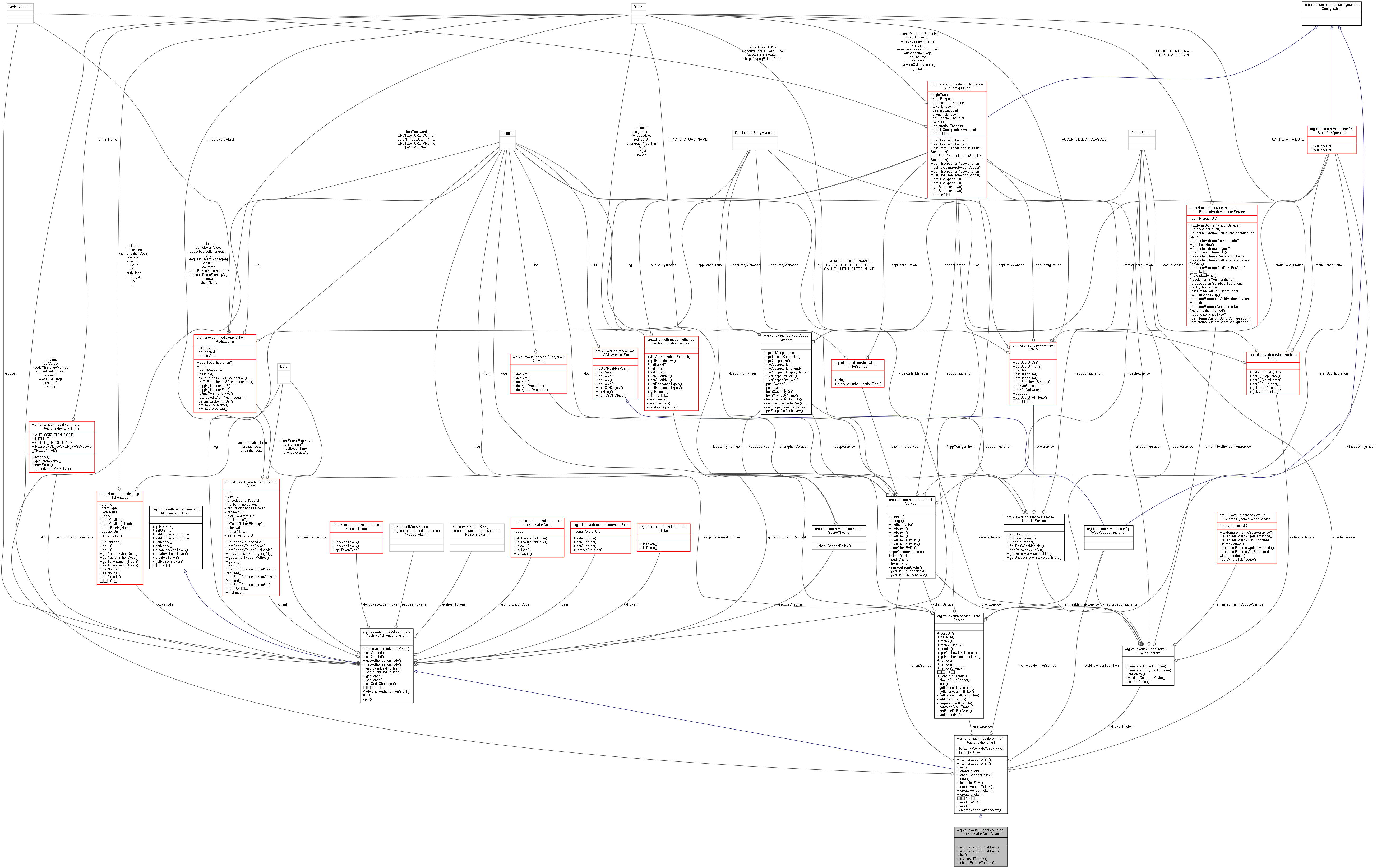

限定公開変数類 | |
| AppConfiguration | appConfiguration |
| ScopeChecker | scopeChecker |
| final ConcurrentMap< String, AccessToken > | accessTokens = new ConcurrentHashMap<String, AccessToken>() |
| final ConcurrentMap< String, RefreshToken > | refreshTokens = new ConcurrentHashMap<String, RefreshToken>() |
詳解
The authorization code is obtained by using an authorization server as an intermediary between the client and resource owner. Instead of requesting authorization directly from the resource owner, the client directs the resource owner to an authorization server (via its user- agent as defined in [RFC2616]), which in turn directs the resource owner back to the client with the authorization code.
Before directing the resource owner back to the client with the authorization code, the authorization server authenticates the resource owner and obtains authorization. Because the resource owner only authenticates with the authorization server, the resource owner's credentials are never shared with the client.
The authorization code provides a few important security benefits such as the ability to authenticate the client, and the transmission of the access token directly to the client without passing it through the resource owner's user-agent, potentially exposing it to others, including the resource owner.
構築子と解体子
◆ AuthorizationCodeGrant() [1/2]
◆ AuthorizationCodeGrant() [2/2]
|
inline |
Constructs and authorization code grant.
- 引数
-
user The resource owner. client An application making protected resource requests on behalf of the resource owner and with its authorization. authenticationTime The Claim Value is the number of seconds from 1970-01-01T0:0:0Z as measured in UTC until the date/time that the End-User authentication occurred.
関数詳解
◆ asToken() [1/4]
◆ asToken() [2/4]
|
inlineinherited |
◆ asToken() [3/4]
|
inlineinherited |
◆ asToken() [4/4]
|
inlineinherited |
◆ asTokenLdap()
|
inlineinherited |
◆ checkExpiredTokens()
|
inline |
Checks all tokens for expiration. Each token will check itself and mark as expired when needed.
org.xdi.oxauth.model.common.IAuthorizationGrantを実装しています。
◆ checkScopesPolicy()
|
inlineinherited |
org.xdi.oxauth.model.common.IAuthorizationGrantを実装しています。
◆ createAccessToken()
|
inlineinherited |
org.xdi.oxauth.model.common.IAuthorizationGrantを実装しています。
◆ createIdToken() [1/2]
|
inlineinherited |
◆ createIdToken() [2/2]
|
inlineinherited |
org.xdi.oxauth.model.common.IAuthorizationGrantを実装しています。
◆ createRefreshToken()
|
inlineinherited |
org.xdi.oxauth.model.common.IAuthorizationGrantを実装しています。
◆ getAccessToken()
|
inlineinherited |
Gets the access token instance from the id token list or the access token list given its code.
- 引数
-
tokenCode The code of the access token.
- 戻り値
- The access token instance or
nullif not found.
org.xdi.oxauth.model.common.IAuthorizationGrantを実装しています。
◆ getAccessTokens()
|
inlineinherited |
Returns a list with all the issued access tokens.
- 戻り値
- List with all the issued access tokens.
org.xdi.oxauth.model.common.IAuthorizationGrantを実装しています。
◆ getAccessTokensCodes()
|
inlineinherited |
Returns a list with all the issued access tokens codes.
- 戻り値
- List with all the issued access tokens codes.
org.xdi.oxauth.model.common.IAuthorizationGrantを実装しています。
◆ getAcrValues()
|
inlineinherited |
org.xdi.oxauth.model.common.IAuthorizationGrantを実装しています。
◆ getAuthenticationTime()
|
inlineinherited |
org.xdi.oxauth.model.common.IAuthorizationGrantを実装しています。
◆ getAuthorizationCode()
|
inlineinherited |
Returns the AuthorizationCode.
- 戻り値
- The authorization code.
org.xdi.oxauth.model.common.IAuthorizationGrantを実装しています。
◆ getAuthorizationGrantType()
|
inlineinherited |
Returns the AuthorizationGrantType.
- 戻り値
- The authorization grant type.
org.xdi.oxauth.model.common.IAuthorizationGrantを実装しています。
◆ getClaims()
|
inlineinherited |
◆ getClient()
|
inlineinherited |
Returns the org.xdi.oxauth.model.registration.Client. An application making protected resource requests on behalf of the resource owner and with its authorization.
- 戻り値
- The client.
org.xdi.oxauth.model.common.IAuthorizationGrantを実装しています。
◆ getClientDn()
|
inlineinherited |
org.xdi.oxauth.model.common.IAuthorizationGrantを実装しています。
◆ getClientId()
|
inlineinherited |
org.xdi.oxauth.model.common.IAuthorizationGrantを実装しています。
◆ getCodeChallenge()
|
inlineinherited |
◆ getCodeChallengeMethod()
|
inlineinherited |
◆ getGrantId()
|
inlineinherited |
org.xdi.oxauth.model.common.IAuthorizationGrantを実装しています。
◆ getIdToken()
|
inlineinherited |
org.xdi.oxauth.model.common.IAuthorizationGrantを実装しています。
◆ getJwtAuthorizationRequest()
|
inlineinherited |
org.xdi.oxauth.model.common.IAuthorizationGrantを実装しています。
◆ getLongLivedAccessToken()
|
inlineinherited |
org.xdi.oxauth.model.common.IAuthorizationGrantを実装しています。
◆ getNonce()
|
inlineinherited |
org.xdi.oxauth.model.common.IAuthorizationGrantを実装しています。
◆ getRefreshToken()
|
inlineinherited |
Gets the refresh token instance from the refresh token list given its code.
- 引数
-
refreshTokenCode The code of the refresh token.
- 戻り値
- The refresh token instance or
nullif not found.
org.xdi.oxauth.model.common.IAuthorizationGrantを実装しています。
◆ getRefreshTokens()
|
inlineinherited |
Returns a list with all the issued refresh tokens.
- 戻り値
- List with all the issued refresh tokens.
org.xdi.oxauth.model.common.IAuthorizationGrantを実装しています。
◆ getRefreshTokensCodes()
|
inlineinherited |
Returns a list with all the issued refresh tokens codes.
- 戻り値
- List with all the issued refresh tokens codes.
org.xdi.oxauth.model.common.IAuthorizationGrantを実装しています。
◆ getScopes()
|
inlineinherited |
Returns a list of the scopes granted to the client.
- 戻り値
- List of the scopes granted to the client.
org.xdi.oxauth.model.common.IAuthorizationGrantを実装しています。
◆ getScopesAsString()
|
inlineinherited |
◆ getSessionDn()
|
inlineinherited |
org.xdi.oxauth.model.common.IAuthorizationGrantを実装しています。
◆ getSub()
|
inlineinherited |
◆ getTokenBindingHash()
|
inlineinherited |
◆ getTokenLdap()
|
inlineinherited |
org.xdi.oxauth.model.common.IAuthorizationGrantを実装しています。
◆ getUser()
|
inlineinherited |
Returns the resource owner's.
- 戻り値
- The resource owner's.
org.xdi.oxauth.model.common.IAuthorizationGrantを実装しています。
◆ getUserDn()
|
inlineinherited |
org.xdi.oxauth.model.common.IAuthorizationGrantを実装しています。
◆ getUserId()
|
inlineinherited |
org.xdi.oxauth.model.common.IAuthorizationGrantを実装しています。
◆ init() [1/2]
|
inline |
◆ init() [2/2]
|
inlineinherited |
◆ isCachedWithNoPersistence()
|
inlineinherited |
◆ isImplicitFlow()
|
inlineinherited |
◆ isValid()
|
inlineinherited |
◆ persist() [1/2]
|
inlineinherited |
◆ persist() [2/2]
|
inlineinherited |
◆ revokeAllTokens()
|
inline |
Revokes all the issued tokens.
org.xdi.oxauth.model.common.IAuthorizationGrantを実装しています。
◆ save()
|
inlineinherited |
org.xdi.oxauth.model.common.IAuthorizationGrantを実装しています。
◆ setAccessTokens()
|
inlineinherited |
org.xdi.oxauth.model.common.IAuthorizationGrantを実装しています。
◆ setAcrValues()
|
inlineinherited |
org.xdi.oxauth.model.common.IAuthorizationGrantを実装しています。
◆ setAuthenticationTime()
|
inlineinherited |
◆ setAuthorizationCode()
|
inlineinherited |
Sets the AuthorizationCode.
- 引数
-
authorizationCode The authorization code.
org.xdi.oxauth.model.common.IAuthorizationGrantを実装しています。
◆ setClaims()
|
inlineinherited |
◆ setCodeChallenge()
|
inlineinherited |
◆ setCodeChallengeMethod()
|
inlineinherited |
◆ setGrantId()
|
inlineinherited |
org.xdi.oxauth.model.common.IAuthorizationGrantを実装しています。
◆ setIdToken()
|
inlineinherited |
org.xdi.oxauth.model.common.IAuthorizationGrantを実装しています。
◆ setIsCachedWithNoPersistence()
|
inlineinherited |
◆ setJwtAuthorizationRequest()
|
inlineinherited |
org.xdi.oxauth.model.common.IAuthorizationGrantを実装しています。
◆ setLongLivedAccessToken()
|
inlineinherited |
org.xdi.oxauth.model.common.IAuthorizationGrantを実装しています。
◆ setNonce()
|
inlineinherited |
org.xdi.oxauth.model.common.IAuthorizationGrantを実装しています。
◆ setRefreshTokens()
|
inlineinherited |
org.xdi.oxauth.model.common.IAuthorizationGrantを実装しています。
◆ setScopes()
|
inlineinherited |
org.xdi.oxauth.model.common.IAuthorizationGrantを実装しています。
◆ setSessionDn()
|
inlineinherited |
org.xdi.oxauth.model.common.IAuthorizationGrantを実装しています。
◆ setTokenBindingHash()
|
inlineinherited |
◆ setTokenLdap()
|
inlineinherited |
org.xdi.oxauth.model.common.IAuthorizationGrantを実装しています。
◆ toString()
|
inlineinherited |
メンバ詳解
◆ accessTokens
|
protectedinherited |
◆ appConfiguration
|
protectedinherited |
◆ refreshTokens
|
protectedinherited |
◆ scopeChecker
|
protectedinherited |
このクラス詳解は次のファイルから抽出されました:
- D:/AppData/OpenId/gluu/src/oxAuth/Server/src/main/java/org/xdi/oxauth/model/common/AuthorizationCodeGrant.java
 1.8.13
1.8.13